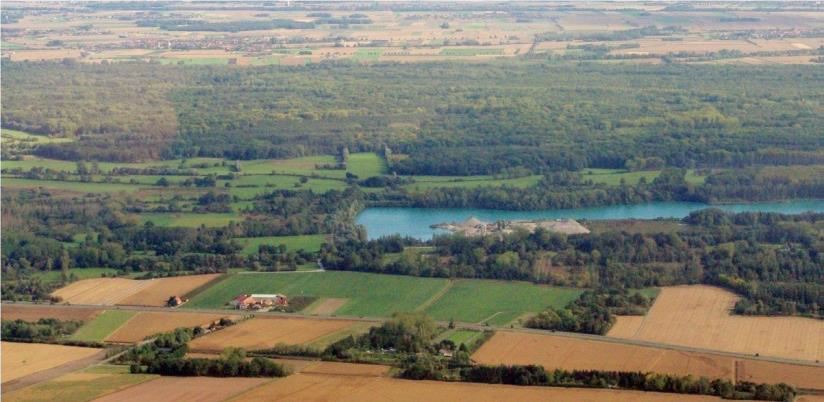La nappe phréatique du Rhin supérieur : le plus grand réservoir d'eau potable de l'UE
La nappe phréatique du Rhin supérieur est l'un des aquifères européens les plus vastes, contenant entre 65 et 80 milliards de mètres cubes d'eau. Elle est essentielle à l'économie alsacienne et fournit 75 % des besoins en eau potable, 50 % des besoins en eau industrielle et 30 % des besoins en eau pour l'irrigation. Soumise à une forte pression anthropique, cette nappe est particulièrement vulnérable à la pollution provenant de diverses sources, étant donné sa faible profondeur. La plaine d'Alsace est également un environnement écologique riche, avec de vastes forêts et de nombreuses zones humides, comme la célèbre région du Ried entre l'Ill et le Rhin, qui abrite une biodiversité importante protégée dans plusieurs espaces naturels.
L’état actuel de la nappe et des écosystèmes associés est fragile, car la qualité et la quantité d’eau pourraient changer considérablement dans un avenir proche en raison du changement climatique et des pressions anthropiques. L'enneigement sera fortement réduit dans les années à venir, impactant le bassin du Rhin supérieur et ses affluents dans toute la vallée du Rhin. Les concentrations de divers contaminants et métabolites dépassent déjà les limites de potabilité de l’eau potable. Les activités humaines menacent donc la disponibilité et la qualité de l’eau à court et à long terme.
Enjeux clés et contribution de l'observatoire pour les résoudre
La nappe phréatique du Rhin supérieur a déjà fait l’objet de plusieurs projets nationaux et internationaux. Cependant, son fonctionnement reste encore insuffisamment connu et des informations clés sur le système et les activités humaines associées font défaut. Le Living Lab de l’Aquifère servira de démonstrateur pour un travail collaboratif entre la recherche académique, les parties prenantes publiques et les entreprises privées, visant à produire des connaissances améliorées sur l’évolution future de la nappe sous l’effet des changements globaux et à co-construire des pratiques agricoles et d’utilisation de l’eau alternatives qui rendront le système plus résilient.
Plus spécifiquement, le Living Lab de l’Aquifère se concentrera sur :
(i) la quantification de l’évolution des ressources en eau dans l’aquifère du Rhin sous les climats futurs ;
(ii) l’étude de l’impact des pratiques agricoles sur la disponibilité et la qualité de l’eau ;
(iii) l’amélioration de la collecte d’informations manquantes (taux de pompage et application des pesticides) ;
(iv) la co-construction de scénarios alternatifs et plus résilients pour l’agriculture et l’utilisation de l’eau.
Cela nécessitera de nouveaux développements méthodologiques sur les modèles de ressources en eau pour mieux intégrer les activités humaines, sur les modèles de transport réactif permettant des simulations de qualité de l’eau à l’échelle du bassin, ainsi que sur la quantification des incertitudes des modèles. Des avancées dans la surveillance et la collecte des données sur l’utilisation de l’eau et l’application des pesticides sont également prévues. Les outils développés et les données acquises serviront à définir et évaluer des scénarios futurs, à alimenter la prise de décision à long terme et à mettre en œuvre des politiques de gestion de l’eau plus durables dans le territoire du Rhin supérieur.



